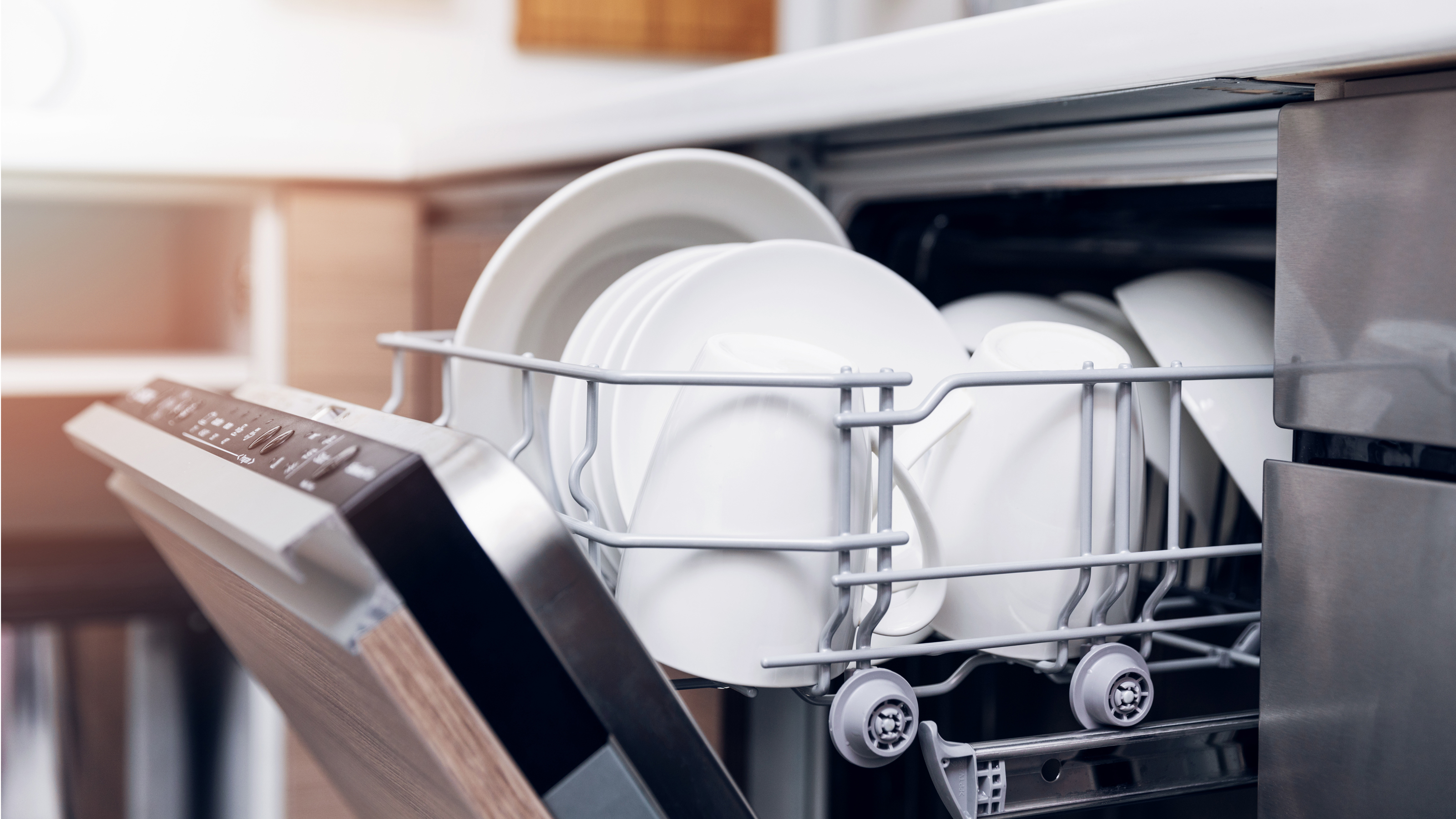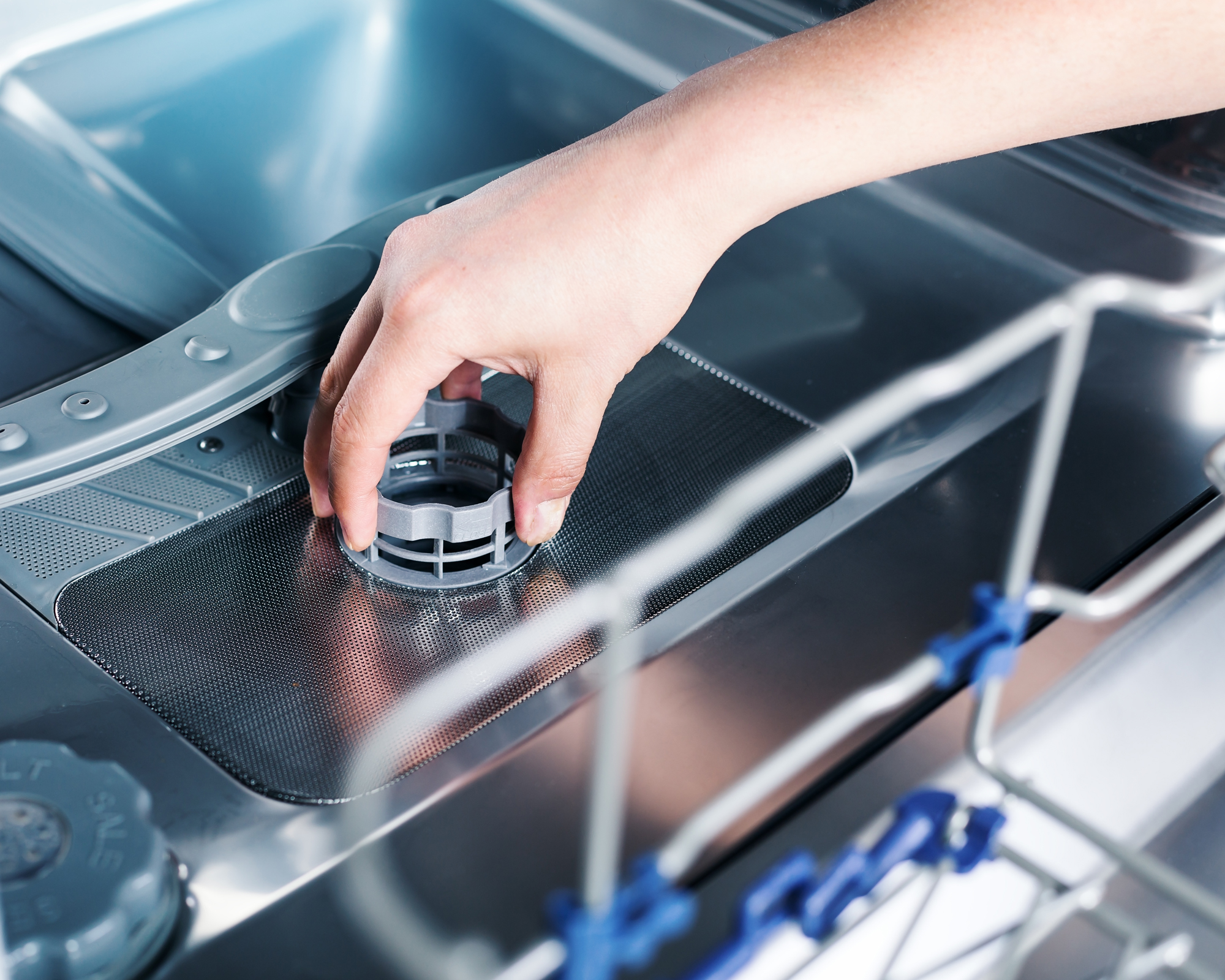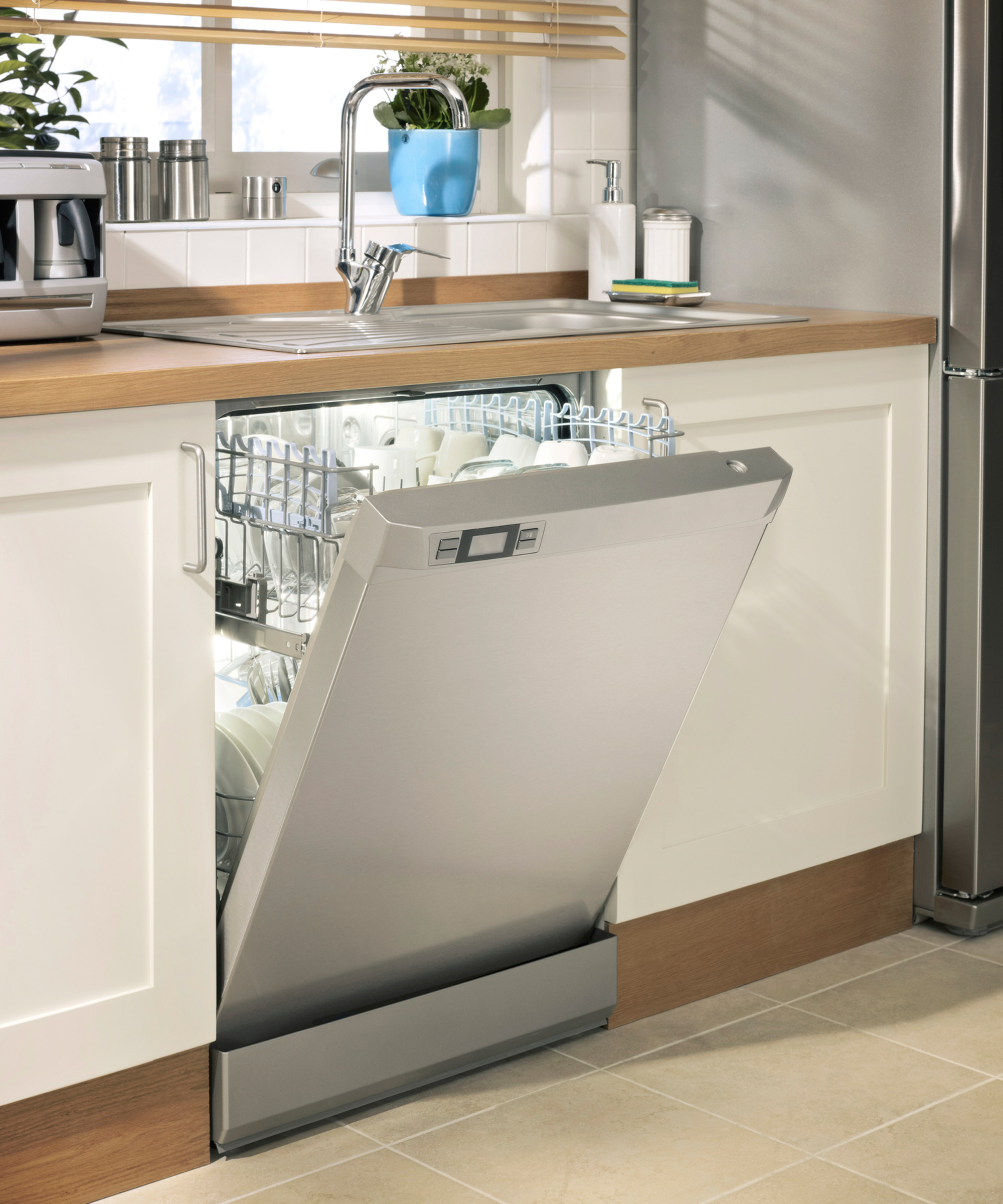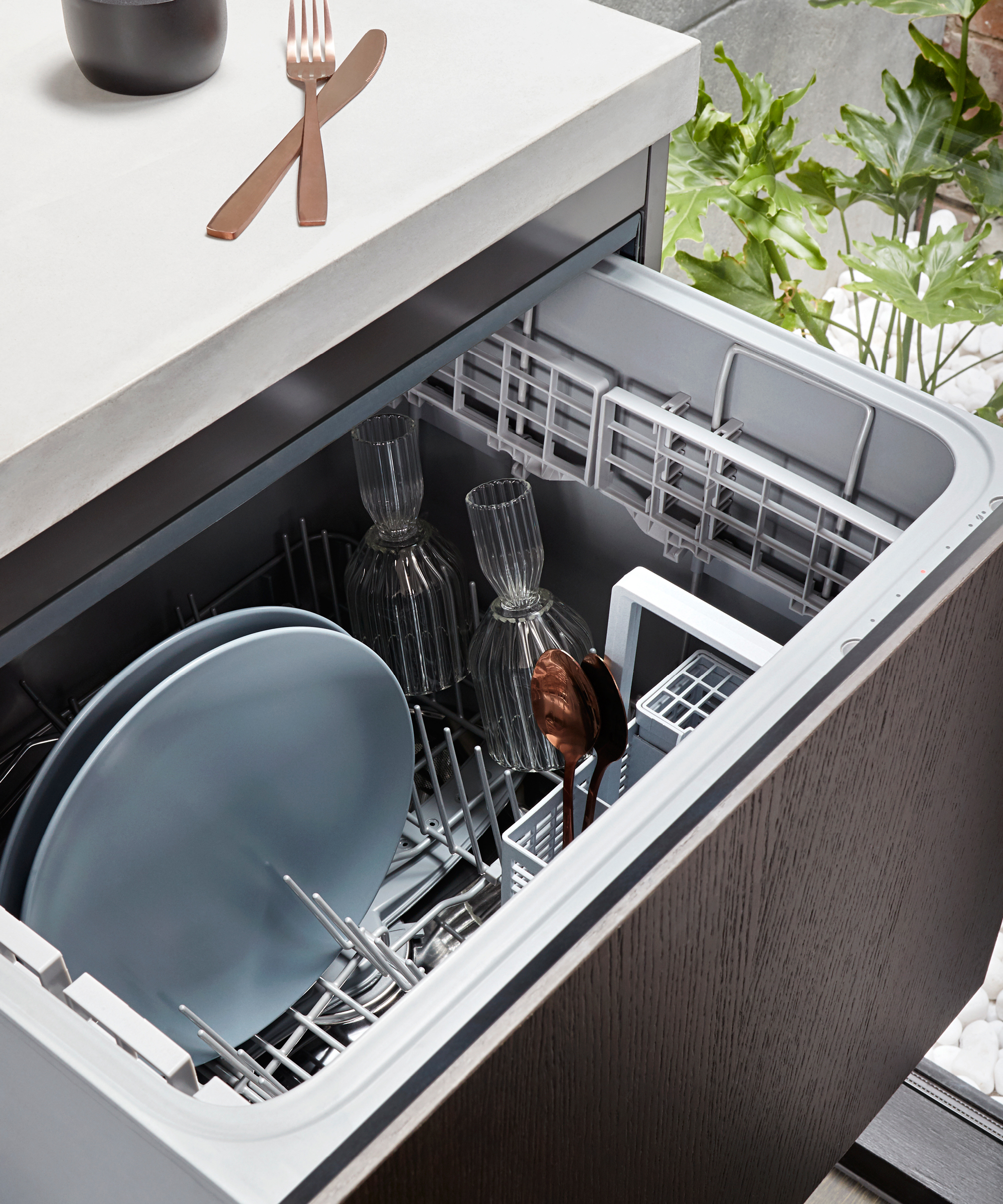Dishwasher not draining? 5 steps to fix it
Follow professional advice on how to fix a dishwasher that's not draining, without damaging your machine. Get rid of standing water and unclog your appliance quickly.

Get small space home decor ideas, celeb inspiration, DIY tips and more, straight to your inbox!
You are now subscribed
Your newsletter sign-up was successful
Is your dishwasher not draining? A clogged dishwasher is inconvenient as standing water in your machine will make the kitchen smell bad and, of course, you'll have to do all those dishes by hand...
Knowing how to clean a dishwasher properly is essential in preventing clog-ups, but if, despite your best efforts, you're finding that the water just won't drain, here's what you should do, according to experts.
How to unclog a dishwasher that won't drain
If you want to fix a dishwasher that's not draining, you'll need to be methodical to get to the route of the problem and to keep your appliance in good shape.
2. Remove any standing water in the dishwasher
Jake Romano, plumbing expert and manager of John The Plumber, explains that the first thing you need to do is 'confirm that the drain the dishwasher connects to is working. The dishwasher will likely connect to the drain under the kitchen sink, so you can test the drain by pouring water into the kitchen sink.' If your kitchen drain is blocked, you are in luck in the sense that you probably don't need to do anything to the dishwasher itself, just clear the drain.
1. Remove any standing water in the dishwasher
Elyse Moody, kitchen expert at Designer Appliances, points out that if you have standing water in the dishwasher, you need to tackle that before you do any further tests. 'I would remove as much as you can with a big measuring cup or a ladle and soak up the rest with old towels. Then try to see what's going on.' The fact is that you don't want dirty dishwasher water standing inside it – you won't be able to do further checks until you've removed it.

3. Check the dishwasher filter
What if the kitchen sink is draining, but the dishwasher is not? Jake recommends checking the dishwasher filter next: 'If your dishwasher has a removable filter, remove it and clean it. Matter and food particles may be blocking the water flow.'
4. Freshen up the filter naturally
Elyse adds that 'If you haven't cleaned it in awhile (or...ever?), there could be food particles blocking' the filter – in some cases, it will be so dirty that you will need to run your whole dishwasher on a hot cycle with vinegar and baking soda.
Get small space home decor ideas, celeb inspiration, DIY tips and more, straight to your inbox!
Jake also recommends baking soda and vinegar for dirty dishwashers with grimy filters: 'Dump 1/2 cup to a cup of each into the drain of the dishwasher. Let it sit for a while and work its magic for 15 minutes to half an hour, then flush it down with some hot water.'

5. Inspect the drain hose
If you're still having issues you should inspect the drain hose. Jake's advice is to 'loosen the dishwasher drain hose clamp and remove the drain hose. Make sure the drain hose is clear by blowing in it. If it bubbles into the dishwasher, the drain hose is clear.'
Elyse also warns those with new dishwashers that they may be experiencing an installation issue: 'The drain hose should have a loop in it to keep dirty water from flowing back into the dishwasher after it drains. If it's not looped, that could explain your problem. On the other hand, you don't want any tight kinks in it that could cut off water flow.'

How do you fix a dishwasher that will not drain?
These are the most common causes of a blocked dishwasher. However, in some cases, there's a more serious issue, and clearing the filter/hose doesn't help the water go down. If this is your case, Jake believes that 'something may be jammed in the dishwasher. To fix this, you will need to disassemble the bottom of the dishwasher, vacuum out the contents of it, and ensure that the parts are moving as they should. However, this process can be complicated, so I'd recommend calling a professional appliance technician.'
Why is there standing water in the middle of my dishwasher?
Elyse also alerts owners of older dishwashers (six to eight years for mainstream brands) that standing water in your washer could be a sign that 'your pump could be starting to wear out. The pump is what sends the water back out through your plumbing, and it's the most important part of your dishwasher.'
How to tell if this is the case? 'If you hear funny sounds when it's running, or it sounds unusual to you, there might be an issue. You might be able to replace the pump, or it might be more economical to replace your dishwasher' with one that's brand new.
Can I use Drano to unclog a dishwasher?
It can be tempting to just chuck some Drano inside your dishwasher and hope for the best. Our dishwasher experts strongly advise against this. Jake is emphatically anti-Drano in dishwashers: 'I would never use Drano in a dishwasher. Drano can break down a lot of materials and can damage your dishwasher. I would never risk it. Instead, you can consider safer alternatives like baking soda and vinegar, or enzyme drain cleaners.'
David Mason, home solutions expert and owner of The Knobx Company, adds that 'Drano is a caustic household cleaner that should not be put in a dishwasher. The high temperatures in the dishwasher could cause Drano to explode.'
Just because a product is easy to get, it's not necessarily the best product to tackle your problem. 'There are powerful chemicals in some sink unblockers that, if misused, can be dangerous. Drano is one example of a chemical that is potentially harmful. It's important to always read the label on these products and follow the instructions carefully.'
Will I need a new dishwasher if it's not draining?
Not necessarily. In the vast majority of cases, a clogged filter or drain hose is to blame, and your dishwasher should be running normally after you've cleaned those parts of the machine.
Using your dishwasher correctly is also important. Jake's advice is: 'Always be sure to rinse plates and dishware before loading them in the dishwasher to increase the longevity of the unit without problems. Also, be careful about what you put down the kitchen sink, as grease can accumulate and cause problems for anything else draining through the same line.'
Anna is a professional writer with many years of experience. She has a passion for contemporary home decor and gardening. She covers a range of topics, from practical advice to interior and garden design.